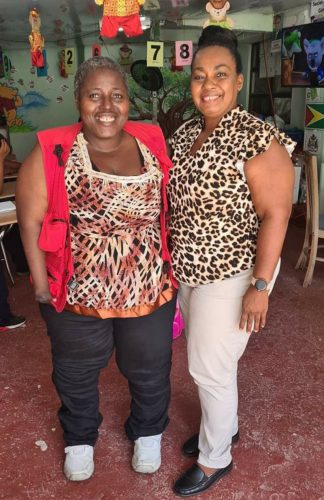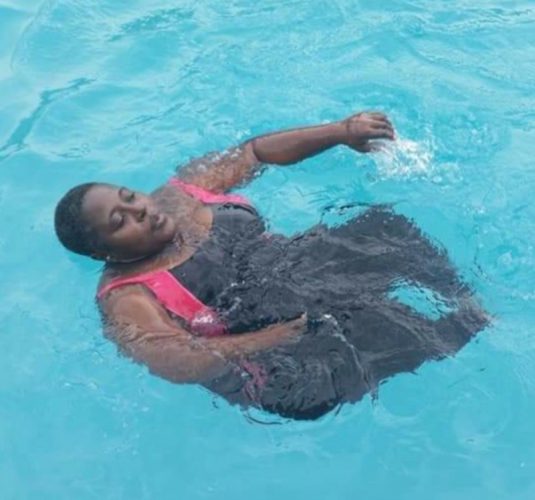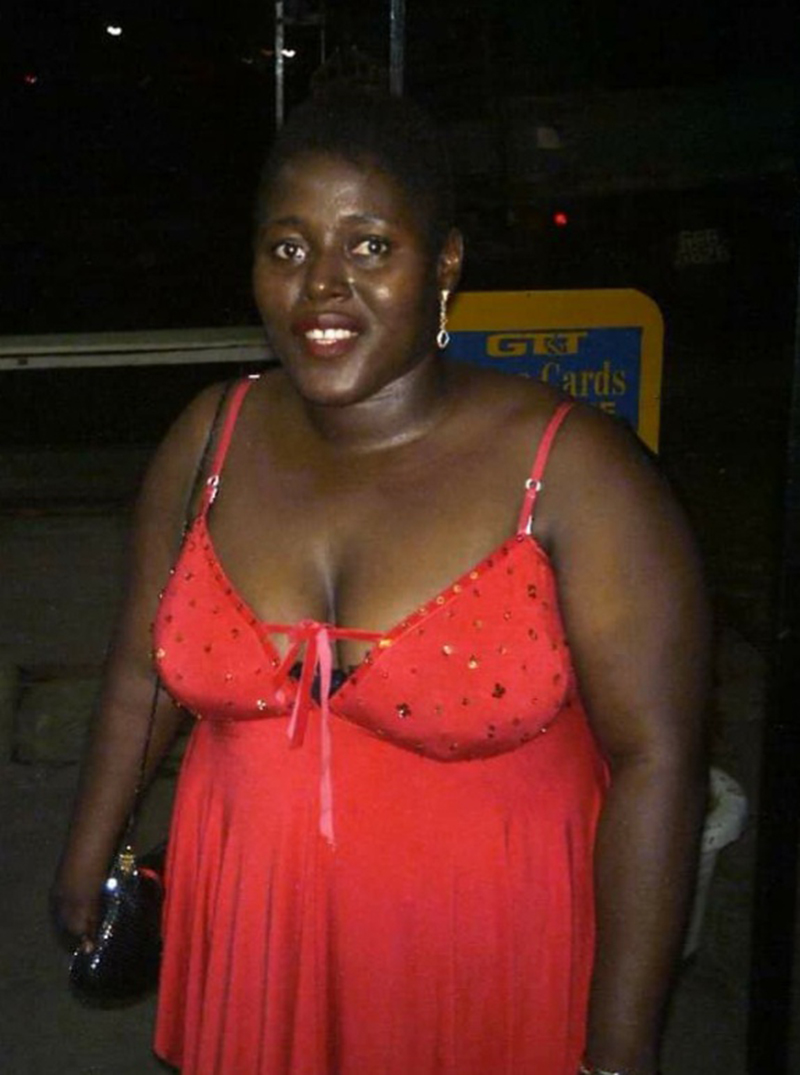Dr Karen Hall is a special education educator, who was born with a congenital physical disability that mimics a triple amputee. Though she attended a school for children with special needs only periodically and started at primary school when she was 12 years old, determination has seen her earn bachelor’s and master’s degrees in special education and a doctorate in anthropology and communications.
Though not amputated, three of her limbs end just below the right knee, at the ankle, and at the wrist on her right arm.
“Some people said I was born that way because my mother or my family is cursed,” she related. “Some said my mom was trying to throw me away. I always told my mother, Barbara Hall, it didn’t matter what people thought, said, or called me once I had her, my grandmother’s and uncle’s love and support. I heard things like, ‘she has a pretty face but it is a pity she was born this way’. I heard them say, ‘she has these skills but…’.”

In the 1980s and 1990s, the parental team – her mother, grandmother and uncle – who raised her and gave her a level of self-esteem that allowed her to flourish, died. “Before I reached 40 years they had all passed on. Whatever smartness and ability I showed, they nurtured… Before I was 11 years old, I read my grandmother’s motivational books on how to live satisfying lives and how to influence people. I read some interesting biographies early in my life that influenced my thinking,” the 54-year-old told this newspaper.
Born in Linden, Hall was an only child. She attended the Linden Centre for Special Needs Children in Mackenzie.
“I went to the special needs school according to my mother’s work schedule. Most of her jobs were at 6 am and school started at 8:30 am. When she couldn’t take me, I read my grandmother’s books. In this way, I was way ahead of what the special school was teaching,” she said.
She struggled with being judged by her appearance. Whenever she stepped out of the home, Hall had and still has to contend with those who have little or no knowledge of people living with physical disabilities.
“I toppled their thinking and they struggled to accept me. They thought I was too much for them or that I wanted too much from life. I had to process all of this. I hadn’t had to process these things at home. Processing things, I understood it was their problem not understanding my situation, not mine,” she said.
Hall was referred to the Ptolemy Reid Rehabilitation Centre where she spent two years.
“There, I faced some unimaginable discrimination. You would think the people who work there would be less discriminatory than the people outside. There was favouritism and the people who should have helped me to develop tried to break me,” she recalled. “There, I lost any nice thing I had. Money I had was stolen. You didn’t know who was who and I developed trust issues.”
Schooling
A few influential people whose houses her mother cleaned were impressed with her ability to read and referred her to people they knew in the Ministry of Education. Through this means she entered the mainstream education system. She was admitted to the Ascension Primary School when she was 12 and told herself she was not going back to special school. She then went on to East Ruimveldt Secondary School (ERSS).

“By the time I got into primary and high school I was way ahead in my reading level. People thought I was brilliant. I wasn’t. It was the exposure I had,” she said. The regular school system had its own challenges. “Today there is still very little access and very little flexibility in the school system to accommodate children with physical disabilities.”
On completing her secondary education, she sought employment through the disability desk at the Ministry of Human Services. “There, I saw how people’s vision of people with disabilities was limited,” she recounted. “I heard someone saying, ‘Why you allowing people like her to come here?’ They were supposedly the professionals.”
By then she was wearing double prosthetic legs, one below the knee and the other for the ankle. (She began to use prosthetics in high school.) She never bothered with a prosthetic hand because she always used the right hand for bracing and lifting bags and weight. “My left hand is the regular hand,” she said.
Those experiences taught her that many tasked with caring for the disabled do not understand how to deliver on the nurturing, sustainability and developmental processes required to assist people with disabilities to grow and become independent. “A philosophy I have lived with since I was 11 years old is, ‘You give a man a fish, you feed him for a day. You teach a man to fish, you feed him for a lifetime.’ I wanted to learn to fish and feed myself for life,” Hall said.
She worked for a short period then realised having several Caribbean Secondary Education Certificate subjects was not enough. “I needed some serious qualifications to get out of being discriminated against,” she said.
She pursued and completed a business course at the Government Technical Institute, then began teaching at her alma mater, ERSS. She then registered for the two-year certificate of business education programme at UG, which introduced her to marketing, finance, economics and statistics. “It was stressful but it gave me a good foundation,” she noted.
Loss
During this period her mother died. She joined the government supported community based rehabilitation (CBR) programme where she worked for about two years as the secretary/accountant clerk. There she exhibited her computer, accounts, financial and management skills. She had previously worked at the Ministry of Education and the Auditor General’s Office as an account’s clerk. “At CBR I was holding two positions and I was able to shine in growing my skills,” Hall said.
When her mother died, she had no money to pay for tuition at UG and no one to sign as guarantor for a loan. “Abruptly, my major support system was cut off,” she noted. “I saw raw discrimination. I started to prepare myself for a scholarship. I did some volunteer work in the education section of the CBR before I joined as a staff member.”
As she was praying about her financial situation, Hall saw a Jesuit scholarship advertised in the newspaper. She applied and got through. “I am not Catholic. After taking two leaves of absence, I graduated from UG in 2011 after seven years,” she said. “I was probably the longest certificate of business education student to graduate. I took two or three leaves of absence to work to earn money for travelling, learning material and living expenses. The scholarship paid for my tuition.”
After that she made three applications for an Organisation of American States (OAS) scholarship before she succeeded. “I had to battle to be a trailblazer and believe me some people were very offended,” Hall said. “They thought I wanted too much. Some people wanted to know why I was going to UG because they felt education would be wasted on me.”
She embraced all the knowledge she acquired. “The challenge was having the knowledge and finding the path through all this maze of discrimination and negative attitudes. I still face these attitudes from time to time.”
She recalled going through immigration in a wheelchair and an immigration officer asking her if she worked and then answering herself by saying, she did not. “I calmly told her I was a teacher while chuckling, but my friend who was next to me was furious. I learned over the years to remain cool instead of having a meltdown which takes a lot of time, energy and emotions.”
After her grandmother died, Hall said, some of her relatives kicked her to the curb. “They came and took away her belongings as though they were entitled.” Her uncle was ailing. He had already looked after her mother when she was ill, and then her grandmother who died from thyroid cancer.
The OAS scholarship she obtained the year after graduating from UG was for a bachelor’s degree in disability studies at Toronto Metropolitan University (TMU) between 2012 and 2015. She gained entry because of her certificate in business education, experience with the CBR and volunteerism. Because the scholarship covered two years, Hall did eight courses in one semester, ten in another and a combination of 14 in two semesters, but she still needed another year to complete two more courses and research.
The Guyana Christian Charities Canada Inc stepped in and paid for the last two courses, her certificate and transcript.
When she returned home from Canada, Hall experienced envy. “My mother’s cousins began to compare me with their children. They said things like ‘When Karen is hustling you all ain’t doing nothing.’” The cousins did not like that and lambasted Hall.
From 1994 to 1997, Hall had worked on the policy document to pave the way for the Disability Act and the Guyana Disability Commission.
On completion of her bachelor’s degree programme, she was seconded from the Ministry of Health to the commission to prepare the bill for the Disability Act. She was the commission’s first programme officer. She worked with lawyers, researchers and did consultations in the field.
“It took me about four years to complete that before presenting the draft bill to the Ministry of Legal Affairs,” she recalled.
After the bill was passed in the Parliament in 2010, the commission had no more work for her. She resigned and went to work at the National Centre for Educational Research and Development (NCERD) where she held monthly workshops for heads of special schools. “One disadvantage of working there was lack of funding to do anything much,” she said.
Between 2010 and 2012, while at NCERD, she obtained an online master’s degree in special education from Walden University, USA. She thought one way of passing on her newly acquired knowledge in special education was through UG and joined the university’s staff in 2013.
“My main reason for going to UG was to deliver a master’s degree or a post graduate programme in special education. I spent six years before I left in 2019 to do my doctorate and still nothing. Every two or three years we did research to run the special education programme. Every time a new head took over, I had to start all over. At UG, I was lecturing to teachers in two introductory courses, autism and general special education, which was inadequate,” she said.
“That kind of focus on meaningful growth of people with disabilities is grossly lacking in the system. It is a hit and miss for the disability community. We have come a long way in education but we are still lagging behind with employment and with detailed training in education. We are putting a lot of students on the streets to beg and they could do far better without public assistance. Teachers can prepare them better with targeted training.”
When she suggested paying a minimal stipend for peer tutoring to whoever was in charge of the commission or NCERD, she said, “it went over their heads because it wasn’t the in-thing to do. I became frustrated because I could see the ways in which we could overcome the lack of funds excuse but there was just no interest. So we make people with disabilities become beggars.” It has become chronic so that even with her qualifications, she said, people tell her, “‘Karen, why you fatiguing yourself? Just go and beg or cry for something and you will get it.’ That is the mentality the country has trained the disabled community to be against having a sustainable income.”
She claimed a lot of people hide behind the excuse of not having resources and behind a shallow interest in people with disabilities to make them look good.
“I try not to judge people because they do not have the exposure I had through my parental team and are not living the life of a person with disability. However, what bothers me is that the things I experienced in the 70s and 80s should not still be happening in the 21st century,” she noted. “We should have more detailed, substantial and targeted programmes equipped to take half of the people off of charity and put them to look after themselves.”
She recalled being sent to work at the then Guyana Telecommunications Corporation where no one helped her to transition to the workplace. “The manager could not be bothered. He waited me out. He made sure I got tired of not doing anything and I left.”
She laughingly said, “All these fiascos were giving me PTSD. I told myself, ‘go for your dreams. Use the skills and knowledge you have. Develop yourself. Make yourself the model. Get yourself another scholarship.’”
The doctorate
“This doctorate is from the throne of God because I had just turned 50. It was a cosmic gift,” Hall said. She was looking at the Erasmus programme in the Netherlands, which is tuition-free but she had to fund her living expenses. While looking for the registration date she saw a pop-up ad for a lecturer or administrator with disability to take part in the Marti i Franques doctorate fellowship at the Universitat Rovira I Virgili in Tarragona, Spain. The Erasmus registration date was in November in 2018 and the other was in July so she applied for both. She got an immediate response from the European Commission, the administrators of the fellowship. She took up the fellowship in the anthropology and communications programme in 2019.
Her research was in digital communication and disability. She has published two articles and will be promoting them online.
During her studies, she used voice apps and digital writing tools. She was offered scribes, extended time for her exams, the use of a computer and a personal invigilator.
“We don’t have that yet in Guyana,” she lamented. “People with disabilities complain to me about the conduct of the exams. I have been talking about these things for years like a voice in the wilderness. Some people won’t speak out because they fear repercussions. I don’t care about repercussions for speaking out. I’ve been to hell and back in a basket so it doesn’t bother me. I have lived through unimaginable discrimination, unimaginable financial craziness, unimaginable health crisis and unimaginable deaths.”
She received her doctorate in January this year and returned home in February.
“I just wish my mom and parental team were here for me to spoil and reward them. The only way I can reward their efforts is to leave the home they left me in a trust for the disabled community I want to support,” she said.






